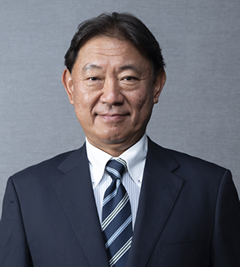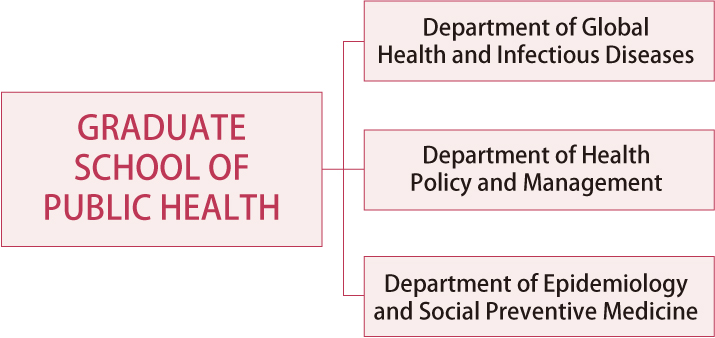Graduate School of Public Health (Professional Degree Program) Opened in April 2024
Message from the President
The IUHW established the Graduate School of Public Health in 1999 to nurture advanced medical professionals who can become leaders in the fields of health and welfare in Japan.
In April 2018, a Graduate School of Medicine (doctoral program) and Public Health (master’s program) were inaugurated to foster competent personnel capable of developing medical sciences through collaborations with the IUHW School of Medicine.
The IUHW will open the Graduate School of Public Health (Professional Degree Program) in 2024 to further enhance the educational and research environment to function as a centre for international medical exchange.
Along with many opportunities to acquire extensive and in-depth knowledge and master academic theory and its application, we will provide a more effective learning system that utilizes information technology, enabling remote access for many working students.

President, International University of Health and WelfareYasuhiro Suzuki, MD, PhD.
Graduated from Keio University School of Medicine. He received two master's degrees (Master of Public Health, Master of Science) from Harvard School of Public Health in the U.S. He has served as Director General (Number 2) of the World Health Organization (WHO) and as Chief Medical and Global Health Officer of the Ministry of Health, Labour and Welfare. He has been a professor at the International University of Health and Welfare Graduate School since January 2021 and a Vice President since March 2021.
Overview of Graduate School of Public Health
Course
Masterʼs Program in Public Health
(2-year course)
Admission quota
20 persons/year
Degree
Master of Public Health (MPH)
Location
Narita Campus and Tokyo Akasaka Campus
Campus location
Narita campus
- location
- 4-3 Kozunomori, Narita City, Chiba Prefecture 286-8686
- Transportation facilities
- 1 minute walk from Kozunomori Station on the Keisei Main Line
Tokyo Akasaka Campus
- location
- 4-1-26 Akasaka, Minato-ku, Tokyo 107-8402
- Transportation facilities
- 3 minutes walk from Exit A of Akasakamitsuke Station on the GinzaLine/Marunouchi Line 3 minutes walk from Exit A of Nagatacho Station on the Yurakucho, Hanzomon, and Namboku Lines 8 minutes walk from Akasaka Station on the ChiyodaLine 8 minutes walk from Tameike on the Ginza Line/Namboku Line Sanno Station” 12 minuteswalk
IUHW Graduate School of Public Health provides
- A comprehensive education of public health by utilizing a number of experts in medicine and public health in various medical institutions and facilities of the International University of Health and Welfare Group.
- An educational curriculum based on the Council on Education for Public Health (CEPH), US Certification Body of School of Public Health.
- Bilingual lectures and advice in English and Japanese.
- Flexible and comprehensive educational environment for public health education and research, designed for a wide range of full-time and part-time students from physicians to specialists in healthcare and public health.
Graduate School of Public Health Characteristics

Three Departments
1. Department of Global Health and Infectious Diseases
We offer a wide-range of public health training and research related to international health and develops the careers of doctors and public health specialists who can make suggestions for public health issues at local, national and international level. Also we develop experts working as core members of researchers of infectious diseases at various medical institutions. Students will gain specialized skills in evaluating data, such as surveillance and carrying out up-to-date technologies for understanding the occurrence and epidemic of infectious diseases.

Head of Global Health and Infectious DiseasesNaoko Yamamoto
Graduated from Sapporo Medical University School of Medicine.
She completed her studies at OkayamaUniversity Graduate School of Medicine and received her MPH from Johns Hopkins University School ofPublic Health in the United States.
He has served as Deputy Director General of the Minister's Secretariat of the Ministry of Health, Labor and Welfare, and Assistant Director-General of the World Health Organization(WHO).
2. Department of Health Policy and Management
We develop critical thinking and applied problem-solving skills for a wide-range of public health policies and systems. Also, we offer knowledge and skills needed in the design, collection and analysis of healthcare data that contribute to the process of policy making, strategic planning and improvement of care process.

Head of Medical Welfare Policy and ManagementShunya Ikeda
Graduated from Keio University School of Medicine.
He is a medical doctor.
He graduated from Harvard School of Public Health.
He is a former visiting scholar at the University of Pennsylvania.
Former full-time lecturer at Keio University School of Medicine.
3. Department of Epidemiology and Social Medicine
We equip students with knowledge and statistical skills to make valuable contributions to medical research, which the essential for clinical trials, epidemiology and pharmaco-epidemiology for designing medical research. Also we offer a wide-range of public health training and researches for resolving various medical and public health issues such as maternal and child health care, elderly health, industrial health and preventive medicine.

Head of Epidemiology and Social Preventive MedicineTsutomu Yamazaki
Graduated from the University of Tokyo School of Medicine (Doctor of Medicine).
He is a former professor(director) of the Clinical Research Support Center and director of the Medical Examination Department at the University of Tokyo Hospital.
He is a director of the Japanese Cerebral and Cardiovascular DiseasePrevention Society, a director of the Regulatory Science Society, and Deputy Editor of International HeartJournal.
He is the director of the University's Future Research Support Center.
Five basic subject areas in public health
- Epidemiology
- Biostatistics
- Environmental health sciences
- Social behavioral sciences
- Health services administration
Acquiring the eight core competencies
- Evidence-based Approaches to Public Health
- Public Health & Health Care Systems
- Planning & Management to Promote Health
- Policy in Public Health
- Leadership
- Communication
- Inter-professional Practice
- Systems Thinking
student payment fee
*Please scroll horizontally to view.
(Unit: Yen)
| Major | Delivery method | enrollment fee |
tuition fee |
Facility maintenance costs |
Partial payment amount |
First year total |
2 years total |
|
|---|---|---|---|---|---|---|---|---|
| Department of Public Health | Bulk | During admission procedures |
200,000 | 600,000 | 100,000 | 900,000 | 1,600,000 | |
| Split | During admission procedures |
200,000 | 300,000 | 50,000 | 550,000 | |||
| After admission (September) |
300,000 | 50,000 | 350,000 | |||||

